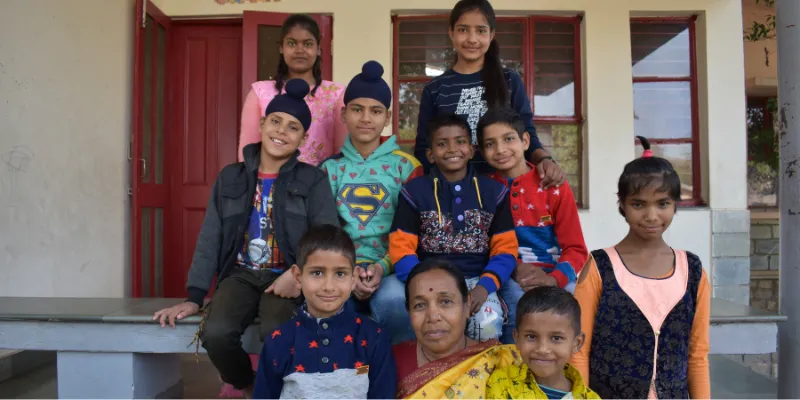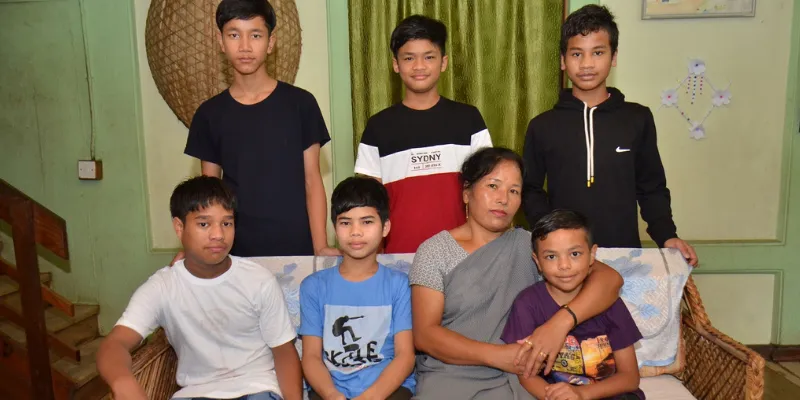[Mother’s Day] These mothers from SOS Children’s Villages of India are raising a generation of children as their own
Meet Mithileshwari Sharma, Jharna Bhag, and Precis Masharing, SOS Mothers from different SOS Children’s Villages of India who have dedicated their lives towards caring for orphaned or abandoned children.
When Mithileshwari Sharma became an SOS mother, she was put in charge of five boys and a 10-day-old baby girl after completing a two-year training by SOS Children’s Villages, an NGO that provides humanitarian and developmental assistance to children in need.

SOS Mother from Raipur - Mithileshwari Sharma
“The moment the little girl was placed on my lap, my joy knew no bounds. I had lost my own child earlier, and had left a troubled marriage, and this moment changed my life forever,” says Mithileshwari, an SOS mother from the SOS Children’s Village in Raipur, Chhattisgarh.
She named the child Suhani, which means one who radiates happiness. And true to the meaning of her name, Mithileshwari says she has brought happiness into her life and those of others. Suhani is now 12 years old.
Married off while she was still in the 12th standard, as was the practice in her village, Mithileshwari left an unhappy marriage and returned home after her divorce. She happened to see an advertisement for an SOS children’s mother at the village panchayat and the image of a happy woman and child attracted her to apply.
Seventeen years later, she is mother to 37 children, 17 of whom are out making their mark in their world, while five children, four girls and a boy, currently stay with her at the home in the village.
SOS Children's Villages of India supports children deprived of parental care. In each of its “villages” across the country, groups of orphaned or abandoned children are cared for in family homes by women who have dedicated their lives to being SOS mothers. SOS Children’s Villages has a total of 7000 children in its facilities across the country, looked after by 445 mothers.
“As an SOS mother, I am completely responsible for the children – from their food, studies, daily routine, and instilling values,” she says.
She speaks proudly of a son who got his first car and ensured she was the first person to ride in it. “I told him to go ahead with the puja and I would visit him when I had the time, but he insisted. It fills me with so much pride,” she adds.
World of love

SOS Mother from Jammu, Jharna Bag with her children
Up north in Jammu, Jharna Bag is busy in her home of nine children in the SOS Children’s Village. She became an SOS mother in 1999, and has since then, enveloped 30 women into her world of parenting and love.
Like Mithileshwari, Jharna, who hails from West Bengal, also escaped an unhappy marriage and got divorced when her daughter was two-and-a-half years old. She trained to be a nurse but had to leave her job at a hospital because her husband would visit her workplace and create a ruckus.
She joined a Mahili Samiti in her village and learned how to sew. The president of the Samiti introduced her to the concept of SOS Children’s Villages, and Jharna thought of giving it a try.
“For two years, I underwent the mandatory training required to become an SOS mother. There were many challenges but I surmounted them all,” she says with pride.
Training for an SOS mother usually takes up to two years, and includes three months of theoretical training on subjects like education, counselling and child psychology, housekeeping, nutrition and conflict resolution. This is followed by 21 months of practical training working in an SOS Children’s Village as an “SOS Aunt”. This lengthy training period prepares them for the reality of becoming an SOS mother. SOS mothers receive free room and board, a household allowance and a salary.
A typical day in Jharna’s life as an SOS mother includes making three meals for her children, getting them ready for school, unlimited conversations on everything under the sun, playing with them and ensuring they are looked after well.
She has also become a dadi and nani (grandmother) and often meets the children who have left her home.
“My sons and daughters are doing well. They are engineers and businessmen, and make me very proud,” she says.
The role is not one without challenges but Jharna believes while the initial training holds them in good stead, SOS mothers can also take the help of counsellors and regular refresher courses to update their skills.
With only two years to go until retirement (an SOS mother retires at 60), Jharna wishes her work could go on forever.
“I am very happy and satisfied… becoming a mother to so many children has been a real blessing,” she says.
Mothers forever

SOS Mother from Shillong, Precis Masharing with her children
In Shillong, Meghalaya, Precis Masharing has been an SOS mother since 2015.
“I came to know of SOS Children’s Villages through a friend in church who was working there. I come from a large family, and love taking care of children. So, I thought this would be the best job for me,” she says.
Precis has taken care of 11 children so far and is now mother to four boys.
“I must admit that I found it very difficult at first. The children come from different backgrounds and circumstances. They found it difficult to adjust and so did I. But after two months, we got used to the idea and are now one happy family,” she says.
Like the other mothers, Precis too is in touch with the children who have left her home and takes pride in their success.
“I keep in regular touch with them and know every aspect of their life,” she says.
The boys stay with their mothers until they are 12-13 years and the girls stay until 18, after which they join the youth programme and continue their education.
Listening to Mithileshwari, Jharna, and Precis’ stories, one can’t help but be reminded of Rudyard Kipling’s famous saying, “God couldn’t be everywhere, so he made mothers.”
Mithileshwari sums it up well, “Maa ek surya ki samman hai, sab ko ek tarah ki Prakash deti hain, samudra aur nadiyon ki tarah apne mein samet leti hai, maa ke jaise chayya kahin nahin mil sakta.” (Mother is like the sun, she spreads equal light on everyone. Under her care, children received boundless love.)
Edited by Anju Narayanan


![[Mother’s Day] These mothers from SOS Children’s Villages of India are raising a generation of children as their own](https://images.yourstory.com/cs/4/8e7cc4102d6c11e9aa979329348d4c3e/sosmothers-1651906056745.png?mode=crop&crop=faces&ar=2%3A1&format=auto&w=1920&q=75)





